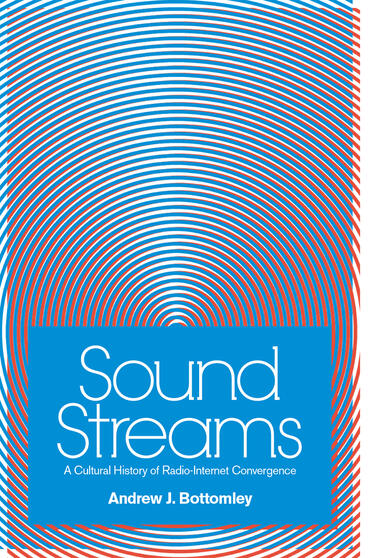Sound Streams
A Cultural History of Radio-Internet Convergence
A history of how radio and the internet have converged and, in doing so, profoundly changed the history of sound media
Description
In talking about contemporary media, we often use a language of newness, applying words like “revolution” and “disruption.” Yet, the emergence of new sound media technologies and content—from the earliest internet radio broadcasts to the development of algorithmic music services and the origins of podcasting—are not a disruption, but a continuation of the century-long history of radio. Today’s most innovative media makers are reintroducing forms of audio storytelling from radio’s past.
Sound Streams is the first book to historicize radio-internet convergence from the early ’90s through the present, demonstrating how so-called new media represent an evolutionary shift that is nevertheless historically consistent with earlier modes of broadcasting. Various iterations of internet radio, from streaming audio to podcasting, are all new radio practices rather than each being a separate new medium: radio is any sound media that is purposefully crafted to be heard by an audience. Rather than a particular set of technologies or textual conventions, web-based broadcasting combines unique practices and features and ideas from radio history. In addition, there exists a distinctive conversationality and reflexivity to radio talk, including a propensity for personal stories and emotional disclosure, that suits networked digital media culture. What media convergence has done is extend and intensify radio’s logics of connectivity and sharing; sonically mediated personal expression intended for public consideration abounds in online media networks.
Sound Streams marks a significant contribution to digital media and internet studies. Its mix of cultural history, industry research, and genre and formal analysis, especially of contemporary audio storytelling, will appeal to media scholars, radio and podcast practitioners, audio journalism students, and dedicated podcast fans.
Andrew J. Bottomley is Assistant Professor of Media Studies at SUNY Oneonta.
Reviews
“With Sound Streams, Andrew Bottomley has rapidly undone whatever we thought we knew about the history of podcasting, streaming, and Internet radio. With engaging storytelling, and precise analysis of almost totally neglected moments in the history of the Internet, Bottomley tells us how we arrived at the current explosion of podcasts and streaming offerings, as well as why today's Internet looks and sounds the way it does and why this matters. In the process, he illustrates conclusively that we must expand our understanding of radio beyond any specific medium. Instead, we come to see radio as a set of practices, aesthetics, and principles that organizes the institutions and technologies that comprise the Internet, journalism, and our imagination of communication. Against the fragmenting, isolating tendencies of our political and media environments, Sound Streams reminds us why and how communities consistently reclaim radio as an indispensable way of doing communication, democracy, and being together.”
- Chenjerai Kumanyika, Rutgers, The State University of New Jersey
–Chenjerai Kumanyika, Rutgers, The State University of New Jersey
“Sound Streams offers a model for new scholarship on the meaning of “radio.” Those outside the radio field will find it fascinating to learn that the history of the internet and the history of radio are entwined; those in the radio field will use this intelligent and carefully-researched text to make the case that there is more continuity between radio and podcasting than there is difference. It is a major text in podcast studies.”
- Neil Verma, Northwestern University
–Neil Verma, Northwestern University
“Sound Streams: A Cultural History of Radio-Internet Convergence is a magisterial work —remarkable in its scope and ambition. It will go down as the definitive history of the first decades of Internet audio.”
- Alexander Russo, The Catholic University of America
–Alexander Russo, The Catholic University of America
"Bottomley (SUNY Oneonta) combines descriptive history of legacy radio broadcasting with archaeological investigation of new streaming media that have emerged with the internet’s growth, arguing that the latter represent a convergence with mid-20th-century nostalgia tech... This stylishly engaging critique concludes by focusing on internet radio’s resurgence as a narrative and storytelling medium, recalling the golden era of American broadcasting. Bottomley suggests that contemporary platforms may echo Brecht’s utopian call for 'crowdsourced radio, a medium that could promote radical social change.'" - S. Lenig, CHOICE Connect
- S. Lenig
"Overall, the book is clearly written and well-organized... The book persuasively argues that even when new forms of distribution are employed, radio remains radio."
- Noah Arceneaux
—Journal of Radio & Audio Media
"...provides a set of crucial ideas in each of the seven chapters, thus presenting very accurate case studies.... this is a comprehensive study on the history of internet, accurately relevant for media scholars interested in radio and audio approaches." - Radio Journal: International Studies in Broadcast & Audio Media
- Radio Journal: International Studies in Broadcast & Audio Media
"Bottomley strongly connects the chapters, which makes them an accessible read. His use of diverse sources, including interviews, helps to strengthen his argument and bring the history to life."
- Technology and Culture
—Technology and Culture
"Bottomley’s goal is to provide a locus for understanding both the history and the potential of radio as an expansive and inclusive modality for the technology, problematizing the way even the most “disruptive” of its current usages, such as podcasting, still replicate traditional institutional structures and models from more traditional broadcast radio’s history through a series of case studies."
- Meryl Krieger
—new media & society
"Such producers and audiences and indeed media scholars and students would do well to learn from revisiting other aspects of radio's history too to obtain a clearer, more accurate understanding of the continuities between "new" forms of media and "older" ones. They could start by reading the highly accessible Sound Streams and listening to the programs that Bottomley highlights." - H-Net
- Anya Luscombe

